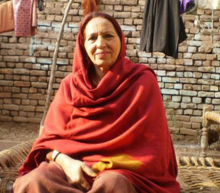Mashooq Sultan
Mashooq Sultan (born Sultana Bibi; 1952 – 19 December 2016), was a Pakistani folk singer and the former actress. The recipient of numerous accolades, including, a highest national literary award of Pakistan the Pride of Performance, she is sometimes referred to as "Melody Queen of the Pashto folk music" for her contributions to Pashto music and "Queen of the stage" for representing Pakistan in numerous foreign countries such as the US, the UK, France, Belgium, the UAE and in Afghanistan.[2][3] As a multilingual singer, she worked in 1,500 albums written in different regional languages such as Urdu, Punjabi, Saraiki and primarily in Pashto language. She is also credited for singing gazals, and also worked as a playback singer in Pashto films.
Mashooq Sultan | |
|---|---|
 Sultana Bibi a.k.a. Mashooq Sultan | |
| Background information | |
| Birth name | Sultana Bibi |
| Also known as | Mashooq Sultan |
| Born | 1952 Swat District, Khyber Pakhtunkhwa, Pakistan |
| Origin | Khyber Pakhtunkhwa |
| Died | December 19, 2016 (aged 63–64) Peshawar, Pakistan |
| Genres | Ghazals, Folk |
| Occupation(s) | Singer, Actress |
| Years active | 1962–2016 |
| Associated acts | [1] |
| Awards | |
She was born in Swat District's Matta town in Khyber Pakhtunkhwa. When she was a child, her family shifted from Shah Dehrai to Mardan. She was married to Walayat Husain at twelve, with whom she had two daughters and four sons.[4][5][6]
Career
When Mashooq was a teen (around sixteen), she first started singing as a wedding singer while performing during wedding ceremonies, and debuted in singing profession in 1962 when a Pakistani radio producer, Nawab Ali Khan Yousafzai introduced her to the national public broadcaster of the country Radio Pakistan at Peshawar station. Besides radio, she was also associated with Pakistan Television Corporation. Prior to singing, she worked in Pashto films such as Jawargar, Janaan[2][7], including her first film Darra Khaibar[5] and later choose to singing.
She received singing training from one of her neighbors who were affiliated with music, and later Nawab Ali Yousafzai took her audition. After audition, she in a duet musical composition sang with Gulab Sher in a children’s programme, designed for preschoolers.[2][8] Later she performed in Rafiq Shinwari's folk song titled "Da pah deryab ke sailaboono." (I am drowned in a stream of your worries) by Fazal Ghani Mujahid which was recorded at Radio Pakistan.
Personal life
During her last days, she experienced extremely difficult circumstances due to poverty and lived in a two-room rented house at Chughalpura, Peshawar. In order to pursuit of better career opportunities in singing, she moved to Peshawar around ten years ago[2][9], and subsequently fractured a leg, leading to sold her jewellery for treatment. It is believed she choose "folk singing" over "playback" due to militancy that affected art and music in Khyber Pakhtunkhwa and in one of its administrative units Swat Valley.[10][11]
In 2008, she alleged provincial government discontinued paying a monthly stipend of Rs. 2,500 (approx. $40) she received since the Pride of Performance was conferred on her.[12]
Awards and accolades
She was the recipient of sixty medals. In 1996, she was awarded the Presidential Pride of Performance in recognition of her contribution to Pashto music.[5][13] In 2010, the Chief Minister of Khyber Pakhtunkhwa, Ameer Haider Khan Hoti presented Rs.3,00,000 to Mashooq for her service to Pashto music.[14] In 2015, the Governor of Khyber Pakhtunkhwa, Mehtab Abbasi presented Rs. 500,000 to her in recognition of her contributions to traditional music of Pashto. She was also the recipient of Tamgha-e-Imtiaz award.[15]
Death
She was suffering from health complications and died in Peshawar on 19 December 2016 of multiple ailments such as hepatitis and diabetes.[5][13]
References
- "پشتو زبان کی معروف گلوکارہ 'معشوق سلطان ' انتقال کرگئیں - انٹرٹینمنٹ". Urdu News (in Urdu). Retrieved 30 June 2020.
- "Prominent Pashto singer Mashooq Sultan passes away". www.thenews.com.pk.
- "Famous Pashto singer Mashooq Sultan passes away". The Nation. 19 December 2016.
- "Pashto folk singer Mashooq Sultan dies at 64". tribune.com.pk.
- "Queen of the stage: Pashto minstrel Mashooq Sultan dead at 64". tribune.com.pk.
- Wall, Nick (28 August 2018). "Around the World in 575 Songs: Asia & Oceania: Traditional Music from all the World's Countries - Volume 3". Politically Correct Press – via Google Books.
- Shabbir, Fahad (19 December 2016). "Renowned Pashto Singer Mashooq Sultan Dies". UrduPoint. Retrieved 1 July 2020.
- "معروف پشتو گلوکارہ 'معشوق سلطان ' انتقال کرگئیں -Daily Jang-Latest News-Entertainment". Jang News (in Urdu). 19 December 2016. Retrieved 1 July 2020.
- "Peshawar melody queen Mashooq Sultan passes away". images.dawn.com. 19 December 2016. Retrieved 1 July 2020.
- "Interview: Mashooq Sultana".
- Desk, Web. "Peshawar melody queen Mashooq Sultan passes away". SUCH TV.
- "FEATURE-Musicians in Pakistan's northwest long for better times". 16 March 2008 – via in.reuters.com.
- "Renowned Pashto singer Mashooq Sultan dies". 19 December 2016.
- "Grant for Saher Afridi, Mashooq Sultan". 21 July 2010.
- "Pashto folk singer Mashooq Sultan awarded Rs0.5m". The Express Tribune. 26 August 2015.